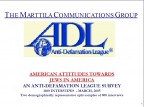Fonte:
Anti-Defamation League - www.adl.org
Washington, D.C., April 4, 2005 … A nationwide survey released today by the Anti-Defamation League (ADL) shows a slight decline in the number of Americans who hold anti-Semitic attitudes, from its 2002 findings, demonstrating once again that “anti-Semitic beliefs endure in America.”
The 2005 Survey of American Attitudes Towards Jews in America, a national poll of 1,600 American adults conducted March 18 through March 25, found that 14 % of Americans – or nearly 35 million adults – hold views about Jews that are “unquestionably anti-Semitic,” compared to 17% in 2002, Previous ADL surveys over the last decade had indicated that anti-Semitism was in decline. Seven years ago, in 1998, the number of Americans with hardcore anti-Semitic beliefs had dropped to 12% from 20 % in 1992.
“What concerns us is that many of the gains we had seen in building a more tolerant and accepting America seem not to have taken hold as firmly as we had hoped,” said Abraham H. Foxman, ADL National Director. “While there are many factors at play, the findings suggest that anti-Semitic beliefs endure and resonate with a substantial segment of the population, nearly 35 million people.”
The survey findings come at a time of increased anti-Semitic activity in America. The 2004 ADL Audit of Anti-Semitic Incidents, released today, shows that anti-Semitic incidents reached their highest level in nine years. A total of 1,821 anti-Semitic incidents were reported in 2004, an increase of 17 percent over the 1,557 incidents reported during 2003.
Anti-Jewish Stereotypes Remain Consistent
“When it comes to Jews, old stereotypes die hard,” said Mr. Foxman, “especially about loyalty, the death of Jesus, and power. For over 40 years one of the most stable and telling indicators of anti-Jewish prejudice in America has been the question of fundamental Jewish loyalty to the U.S. The survey found that 33% of Americans believe Jews are more loyal to Israel than America, no change from 2002. In 1998, it was 31%; in 1992; 35%.
Thirty percent (30%) of the American people believe Jews were responsible for the death of Christ, up from 25% in 2002.
Stereotypes about “Jewish power” in the U.S. have replaced many of the classical ethnic stereotypes previously attributed to Jewish Americans. The survey revealed that while the percentage of Americans who believe Jews have too much power has diminished, Americans who hold the most anti-Semitic views are preoccupied with the perceptions of Jewish power:
“Too much power in the US”
General population – 15%, down from 20% in 2002
Most anti-Semitic – 70 %
“Too much power in the Business world”
General population – 19% down from 23% in 2002
Most anti-Semitic – 80%
“Too much control of Wall Street”
General population – 17% down from 20% in 2002
Most anti-Semitic- 75%
Population Segments
Regarding one of the most significant and fastest growing segments of the American population, Hispanics, there continues to be an extraordinary gap between those born in the United States and those born abroad, though somewhat less than in 2002. The survey revealed that 35 % of foreign-born Hispanics hold hardcore anti-Semitic beliefs, (down from 44%) while 19 % of Hispanics born in the U.S. fall into the same category (down from 20%). The anti-Semitic propensities of Hispanics were significantly above the national average — 29% for Hispanics; 14% for all Americans.
“We are heartened to see some progress in the Hispanic community,” said Mr. Foxman. “We understand that religious background has always played a role in determining one’s beliefs about Jews. So it is not surprising, though distressing, that one of the fastest growing segments in America holds strong anti-Semitic views. There is no doubt that this is a reflection of what is being learned about Jews in the schools, churches and communities of Latin American countries, which is anti-Semitism at its most basic.”
Mr. Foxman added that, “the outreach and collaboration with various segments of the Hispanic community throughout the country that we began after the initial findings has borne some results and we are committed to stepping up that effort.”
The number of African-Americans with strong anti-Semitic beliefs continued to remain high and stable since 1992. The 2005 survey found that 36% of African-Americans hold strong anti-Semitic beliefs, four times more than the 9% for whites. In 1992 it was 37%; 1998 – 34%; 2002- 35%.
“We continue to remain troubled and somewhat at a loss to understand why African-Americans consistently have such strong anti-Semitic propensities,” said Mr. Foxman.
Education and age also continued to play roles in determining anti-Semitism.
Less educated Americans continue to be more likely to hold anti-Semitic views:
• Education – The more educated a person is, the less likely he or she is to hold anti-Semitic views: 35% of high school graduates hold strong anti-Semitic views, compared to 13% of college graduate and 5% of those who hold post graduate degrees.
• Age – The older a person, the more likely he or she is to hold anti-Semitic views: 24% of adults over the age of 65 hold strong anti-Semitic views, compared to 12% of those 18-29 years old and 11% of those 30-39 years old.
On a positive note, the survey found a majority of Americans favors measures that would support and teach tolerance and support diverse student bodies:
• 50% agree to stopping racist and anti-Semitic groups from using the Internet.
• 64% are for imposing tougher sentences for hate crimes
• 88% say the Holocaust should be taught in schools.
• 75% agree that students do better when they attend schools with a racially and ethnically diverse student body.The survey, which has a margin of error of +/- 2.8%, was conducted by The Marttila Communications Group, a Boston-based public opinion research firm, which has conducted ADL’s previous surveys on anti-Semitism, using similar questions and criteria to measure and monitor levels of anti-Semitism in the U.S.


